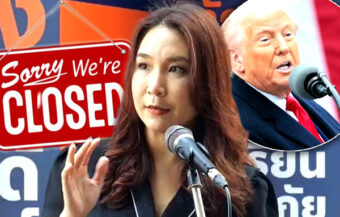Tourism chief targets high-spending Europeans and Middle Easterners for the second half of 2025 as cabinet orders shorter visa stays amid rising concern over foreign abuse and crime linked to long-term visitors from China, Russia and India.
Thailand’s Minister of Tourism and Sports is moving decidedly away from China as a key tourist market. Indeed, the ministry is also looking away from Asia, where numbers for the first three months to Thailand were down by 17%. Instead, the kingdom is seeking to attract more European holidaymakers to Thailand in the second half of the year. In short, the Permanent Secretary at the Ministry and Chairman of the Tourism Authority of Thailand (TAT), Ms. Natthriya Thaweevong, believes this is the path to higher spending this year. The kingdom presently is seeking to reach the ฿2 trillion income mark last attained in 2019. It comes with the government, however, moving in the other direction. A crackdown on abuse has seen the Thai cabinet on Tuesday called for shorter visa stays.

Thailand’s Ministry of Tourism and Sports has finally acknowledged that the kingdom is fighting a losing battle to attract Chinese tourists. Last week, the Permanent Secretary at the Ministry and Chairman of the Tourism Authority of Thailand (TAT) set out a bold new strategy.
Ms. Natthriya Thaweevong wants Thailand to pivot away from the Asian market and focus on long-haul Western travellers. In particular in those coming from Europe and key Middle East countries. The Ministry has identified these tourists as having higher spending habits.
Thailand targets long-haul Western and Middle East markets as Asian tourist numbers continue to decline
For instance, the average Swedish traveller spends ฿69,817, Austrians spend ฿66,729, while Saudi Arabian tourists spend ฿68,354. Another top market is the United Kingdom, where the average traveller now spends ฿60,823 per trip.
Simultaneously, these visitors also have a higher potential to become regular visitors to the kingdom. This comes after a precipitous drop in Chinese tourists by the end of January. Presently, the number of Chinese arrivals in Thailand is only 7,000 visitors per day.
Meanwhile, overall there has been a drop in Asian visitors, with traffic in the first three months down by 17%. The decline has been especially notable among visitors from China, Hong Kong, Taiwan, South Korea and Vietnam.
Officials attribute the downturn not only to safety concerns following high-profile crimes. Indeed there is reduced confidence fuelled by warnings from foreign governments and cutbacks in flights after the Songkran holiday.
Confidence among Asian tourists falls sharply after crime wave and post-Songkran flight reductions
Despite this, the tourism market for the opening three months held up, with numbers up 1.9% from last year. However, spending was disappointing, generating only ฿471 billion.
The top ministry official now accepts that this year’s income target of ฿2.3 trillion will not be met. Instead, Thailand will be now aiming for ฿2 trillion. This shows the country still trails its 2019 record performance. Notably, that coincided with a shift towards more Asian and short-haul tourists.
Ms. Natthriya has made it clear that Thailand can no longer rely on headcount alone. She has proposed redefining the country’s tourism key performance indicators (KPIs). In effect, the country must focus on spending per visitor.
Furthermore, it must place greater emphasis on long-haul markets. Her strategy involves targeting specific segments such as medical and wellness tourists. For example, these travellers often travel with families and book long-stay accommodation.
Thailand to refocus tourism strategy by targeting medical tourists and measuring spend over visitor count
In short, Ms. Natthriya may be on the right track. Nonetheless, Thailand finds itself now battling against the odds. The kingdom welcomed 9.49 million tourists in the first three months.
After that, it is projecting 8.37 million arrivals for the second quarter, with income estimated at ฿390 billion. Indeed, targeting more long-haul non-Asian travellers is required, as they spend more. Thai planners believe many European travellers this year may avoid the United States. It is a marked trend supported by recent market data.
Meanwhile, Europeans continue to have relatively high spending power. At the same time, they find Thailand an attractive low-cost destination.
The Ministry has forecasted that the second quarter of 2025 could see significant gains from markets such as the UK, Germany, Israel and Australia, which have already recorded air ticket booking increases of up to 10%.
This is prompting tourism authorities to prepare tailored tour packages, especially for premium segments like medical tourists.
Thailand prepares tailored packages for premium travellers as second quarter booking data shows promise
Nevertheless, this new policy initiative is coming as the Office of the Prime Minister has issued a new directive. On Tuesday, it ordered the Ministry of Tourism and Sports, Ministry of Foreign Affairs and Interior Ministry to revise visa terms. It ordered a focus on shorter stays.
This move follows representations by the Thai tourism industry itself, alarmed by the deteriorating security situation damaging Thailand’s reputation in Asian markets.
The 90-day visa is seen as a key part of the problem. People from countries like Russia, China, and India arrive in Thailand and establish businesses. Recently, the Royal Thai Police cracked down on Chinese-owned restaurants in Bangkok, some established and managed by Chinese tourists.
Similarly, Russian tourist operators in Phuket are collaborating with others in their home countries to establish extensive tourism-related businesses.
Additionally, foreigners are working as tour guides and providing other services typically offered by Thais.
Visa policy faces overhaul as government aims to reduce abuse and address security concerns in tourism
Government House spokesman Jirayu Huangsap stated on Tuesday that the order came during the weekly cabinet meeting.
“Some groups of visitors have abused the scheme and violated the law, such as overstaying their visas and working illegally in the country,” he said.
He explained that the Prime Minister has ordered a study or review of the situation. Many Thai tourist industry firms and service providers have supported the reversal. However, it goes against the views of higher-end resorts targeting high-spending foreign tourists.
Mr. Krip Rojanastien, Chairman of Chiva-Som International Health Resorts, this week even called for longer tourist visa stays.
Mr. Rojanastien has particularly observed many long-stay travellers attracted to Hua Hin in Thailand. In contrast to short-stay travellers, he says Thailand should target these tourists. Many are already long-haul travellers who regularly visit Thailand.
Calls grow for longer visas despite abuse concerns as resorts push for support of long-stay visitors
He advocates extending the current 60-day visa to 90 days.
“Health and wellness travellers need ample time to achieve their wellness goals, often spanning weeks or months. If the visa-free stay period is reduced, they may opt for other destinations that better suit their needs,” he declared.
Indeed, this should come as no surprise to Thai planners. Undeniably, there is a link between long-haul travellers and longer stays with higher spending power.
At the same time, there is undoubtedly a problem with abuse, particularly from specific countries. At the same time some with histories of mafia-related gangs and widespread corruption.
Many people abusing the system in Thailand are fleeing their home countries. Nevertheless, ironically they are bringing with them criminal activities accepted back home.
Thai economy thrown into disarray by Trump’s tariffs. Exports and Tourism may both be far lower in 2025
Tourism minister orders all Bangkok hotels surveyed as this Friday’s shocking Earthquake fallout mounts
In response, the government has initiated a full-scale study to determine an optimal visa-free stay period that supports tourism while curbing abuse.
The findings of this study, along with the TAT’s revised 2025 tourism strategy, are expected to be finalised and implemented by the second half of the year.
Ms. Natthriya emphasised that this is an urgent adjustment. Thailand must now negotiate an increasingly competitive global tourism market while still trying to recapture its pre-pandemic performance.
Join the Thai News forum, follow Thai Examiner on Facebook here
Receive all our stories as they come out on Telegram here
Follow Thai Examiner here
Further reading:
Thaksin does not rule out joining talks in US as Thai team finalises plans. They fly out on Thursday
Trump’s remaking of World trade, if it works, will force Thailand to decide between the US and China
US offers a 90-day tariff pause but Thailand must move faster as it already faces shaved GDP in 2025
PM addresses the nation in shock over last week’s earthquake and this week’s Trump tariff bombshell
Finance Minister to travel to US to import more US food and motorbikes while lowering Thai tariffs


















